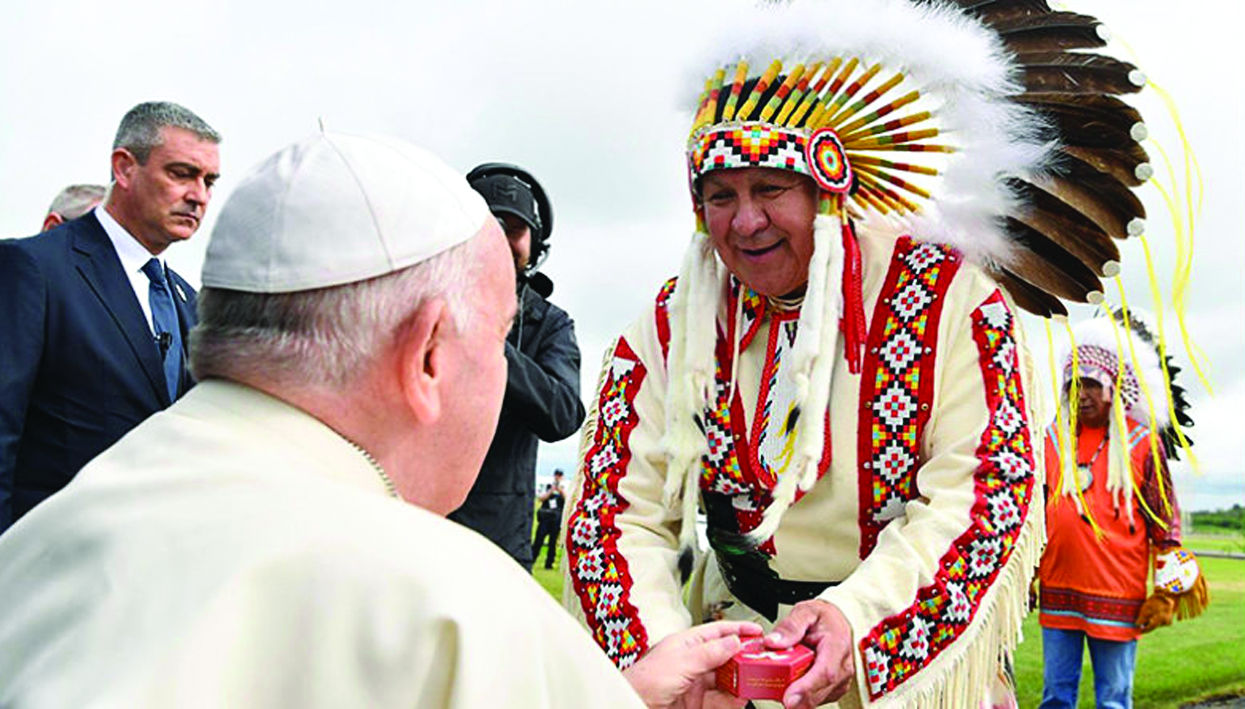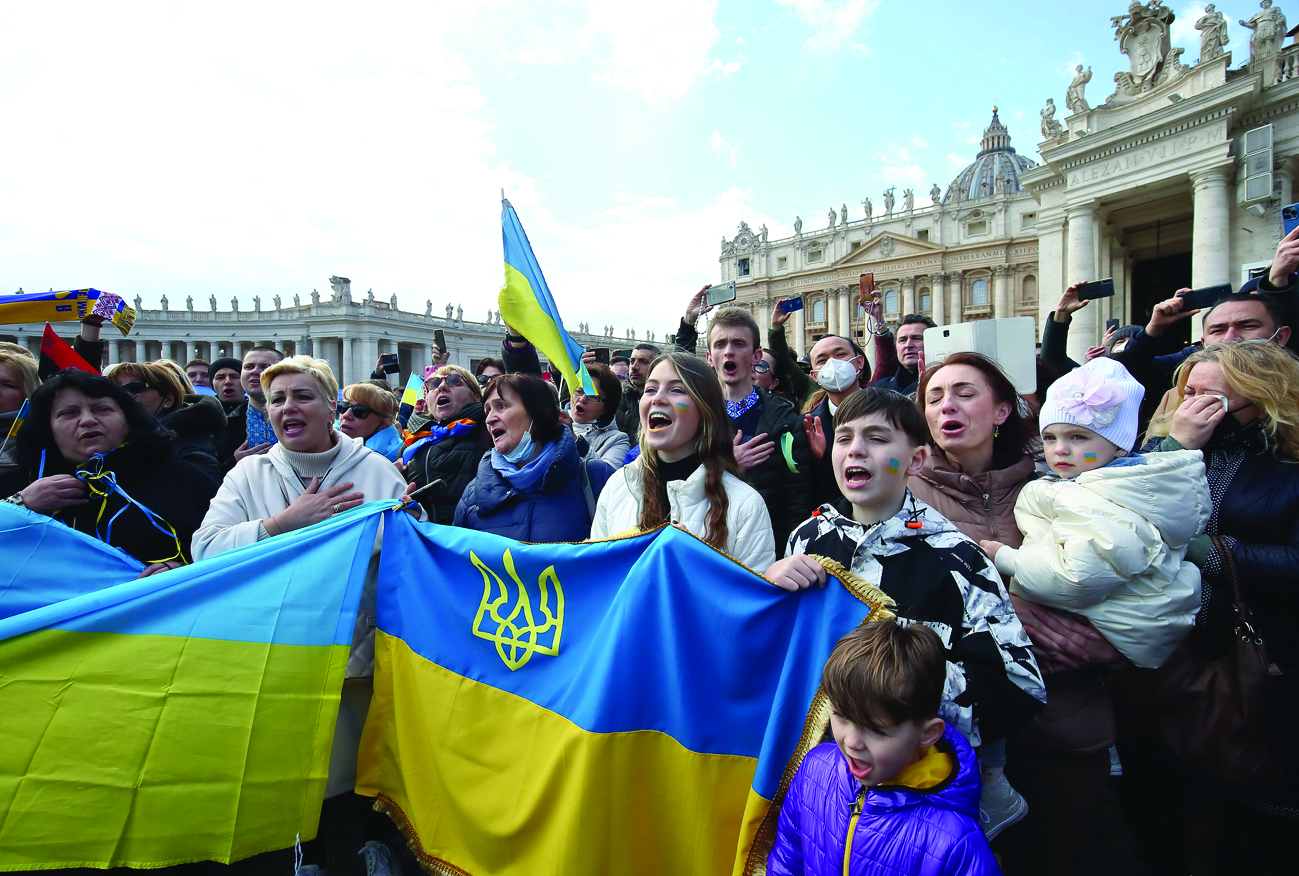October
Wednesday 10
POPE ON VATICAN II TEXTS
Though they were written a half-century ago, the documents that came out of the Second Vatican Council are indispensable for helping today’s Christians navigate their way in a stormy world, Benedict XVI said at his weekly general audience.
Unfortunately, the Council’s sixteen landmark documents have been buried under “a mass of publications, which, instead of making (the Council’s texts) known, have often hidden them,” he said.
The Council’s teachings need to be “liberated” from the deluge, he said, because today they can still be “a compass that guides the vessel of the Church for sailing the open seas — in the middle of storms or in calm and peaceful waves — to safely reach its destination,” the pontiff said.
“We have to learn the simplest and key lesson of the Council,” which is that Christianity “consists of faith in the triune God and in a personal and communal encounter with Christ who orients and gives meaning to life. Everything else flows from this,” Pope Benedict said.
BENEDICT XVI RECALLS VATICAN II
On the eve of the 50th anniversary of the opening of the Second Vatican Council, L’Osservatore Romano, the Vatican newspaper, published a short reminiscence of the Council by Pope Benedict XVI.
In the essay, the Pope recalls his presence at the opening of Vatican II, which he attended as a theological adviser. He both praised and criticized some of the Council’s most consequential documents regarding religious liberty and the Church’s relationship with non-Christian religions and the modern world.
The essay is the introduction to a forthcoming collection of previously unpublished Council-era writings by then-Father Joseph Ratzinger. The collection will be published in German this November.
Thursday 11
VATICAN II MESSAGES FOR LAITY TO HELP CHANGE WORLD
At the end of the Mass in St. Peter’s Square marking the 50th anniversary of the opening of Vatican II and the start of the Year of Faith, the Pope gave out texts of the special messages that Pope Paul VI had composed for seven categories of the faithful; Pope Benedict chose contemporary representatives of those groups to receive the messages.
The seven messages, initially presented by Pope Paul VI on December 8, 1965, address the concerns and responsibilities of: political leaders; scientists and cultural figures; artists; women; workers; the poor, sick and suffering; and young people.
Pope Benedict gave the “Message to Politicians” to some members of the diplomatic corps accredited to the Holy See, including ambassadors to the Vatican from each continent.
The message said that the only thing the Church asks of politicians is freedom — “the liberty to believe and to preach her faith, the freedom to love her God and serve him, the freedom to live and to bring to men her message of life. Do not fear her.”
POPE RECALLS “AUTHENTIC SPIRIT” OF VATICAN II
In his homily at the anniversary Mass, Benedict XVI called on Catholics to revive the “authentic spirit” of Vatican II by re-proposing the Church’s ancient teachings to an increasingly Godless modern world.
The pontiff spoke at a special Mass in St. Peter’s Square, half a century to the day after the opening ceremonies of Vatican II. About 400 bishops from around the world, including 15 of the 70 surviving members of the 1962-65 Council, attended. Orthodox Ecumenical Patriarch Bartholomew of Constantinople and Anglican Archbishop Rowan Williams of Canterbury attended as special guests.
“The Council Fathers wished to present the faith in a meaningful way,” the Pope said, “and if they opened themselves trustingly to dialogue with the modern world it is because they were certain of their faith, of the solid rock on which they stood.”
Pope Benedict’s homily celebrated Vatican II but deplored much of what followed in its wake.
During an evening candlelight vigil, reminiscent of one held exactly 50 years earlier, Pope Benedict warned of sin and imperfection within the Church.
From his apartment window, Pope Benedict spoke off-the-cuff to the nearly 10,000 people gathered in the square and recalled how he had been at that candlelight procession 50 years earlier, looking up at the same window where he now stood.
Wednesday 17
IGNORANCE OF FAITH IS A RISK
Ignorance of the faith puts Christians at risk of following a “do-it-yourself” religion, Benedict XVI said.
People need to become more familiar with the Creed because it is there that the “Christian moral life is planted and… one finds its foundation and justification,” the Pope said at his weekly general audience.
The pontiff began a new series of audience talks to accompany the Year of Faith, which marks the 50th anniversary of the opening of the Second Vatican Council.
The Holy Father also marked International Day for the Eradication of Poverty, observed October 17, to promote greater awareness of poverty and destitution worldwide.
POPE to SEND CARDINALS TO SYRIA
A papal delegation of bishops was to travel to the capital of war-torn Syria in late October to show solidarity with victims and encourage peace negotiations.
“In the certainty that the only possible solution to the crisis is a political solution, and bearing in mind the immense suffering of the population, the fate of displaced persons, and the future of that nation, it has been suggested that our synodal assembly express its solidarity,” Cardinal Bertone, Vatican secretary of state, said during the announcement at the evening session of the world Synod of Bishops.
The members of the delegation will be: Cardinal Timothy M. Dolan of New York; Congolese Cardinal Laurent Monsengwo Pasinya of Kinshasa; Cardinal Jean-Louis Tauran, president of the Pontifical Council for Interreligious Dialogue; Bishop Fabio Suescun Mutis, the military ordinary of Colombia; Bishop Joseph Nguyen Nang of Phat Diem, Vietnam; Archbishop Dominique Mamberti, Vatican secretary for relations with states; and Msgr. Alberto Ortega, an official of the Vatican secretariat of state.
Sunday 21
POPE PROCLAIMS SEVEN NEW SAINTS
Proclaiming seven new saints, Benedict XVI today said they are examples to the world of total dedication to Christ and tireless service to others.
In a revised canonization rite, the pontiff prayed for guidance that the Church would not “err in a matter of such importance” as he used his authority to state that the seven are with God in heaven and can intercede for people on earth.
An estimated 80,000 pilgrims from the United States, Canada, the Philippines, Italy, Spain, Germany and Madagascar filled St. Peter’s Square for the canonization of the holy women and men who ministered among their people.
The new saints are:
— St. Kateri Tekakwitha, an American Indian who was born in the United States and died in Canada in 1680;
— St. Mother Marianne, a Sister of St. Francis who traveled from Syracuse, New York, to Hawaii to care for people with Hansen’s disease and died in Molokai in 1918;
— St. Pedro Calungsod, a teenaged Philippine catechist who was martyred in Guam in 1672;
— St. Jacques Berthieu, a French Jesuit priest martyred in Madagascar in 1896;
— St. Giovanni Battista Piamarta, an Italian priest who founded religious orders and died in 1913;
— St. Carmen Salles Barangueras, a nun who founded a Spanish religious order and died in 1911;
— St. Anna Schaffer, a lay German woman, who died in 1925.
In his homily at the Mass following the canonization, Pope Benedict prayed that the example of the new saints would “speak today to the whole Church” and that their intercession would strengthen the Church in its mission to proclaim the Gospel to the world.
Tuesday 23
TRIP OF PAPAL DELEGATION TO SYRIA POSTPONED
The visit of a papal delegation to the capital of war-torn Syria, previously announced for late October, has been postponed indefinitely, and the delegation’s membership, which was to have included Cardinal Timothy Dolan of New York, will be changed.
Wednesday 24
SSPX EXPELS BISHOP WILLIAMSON
The leadership of the traditionalist Society of St. Pius X has expelled British Bishop Richard Williamson from the society, saying he distanced himself from them and refused “to show due respect and obedience to his lawful superiors.”
“This painful decision has become necessary by concern for the common good of the Society of St. Pius X and its good government,” said a brief note posted on the group’s website.
Bishop Williamson had been a critic of the group’s engagement in doctrinal discussions with the Vatican, which were aimed at bringing the society back into full communion with the Catholic Church.
“MATERIAL PROGRESS NOT ENOUGH TO MAKE PEOPLE FREE, HAPPY”
The world’s enormous technological and scientific progress hasn’t always made people freer or happier, Benedict XVI said at his weekly general audience.
“We need not just material sustenance; we need love, meaning, hope and a solid foundation” that helps people live with courage even in the face of doubt, difficulties, and everyday problems, he said.
His talk focused on the nature of faith and what it means to believe.
At the end of his general audience talk, Pope Benedict called on young people, newlyweds and the ill to look for inspiration from Blessed John Paul II, whose feast day was October 22.
Among the many dignitaries the Pope greeted after the audience was Archbishop Carlo Maria Vigano, the apostolic nuncio to the United States. They engaged in a minute-long exchange, after which the archbishop knelt before the Pope, kissed his ring and thanked him.
POPE NAMES SIX NEW CARDINALS
Benedict XVI surprised pilgrims in St. Peter’s Square at the end of his weekly general audience
by announcing he would create six new cardinals.
The pontiff said the consistory to create the new cardinals, who come from six countries, would take place November 24, the eve of the feast of Christ the King on November 25.
The new cardinals will include:
— American Archbishop James M. Harvey, prefect of the papal household, 63;
— Lebanon’s Maronite Patriarch Bechara Rai, 72;
— Archbishop Baselios Cleemis Thottunkal, 53, of Kerala, India, head of the Syro-Malankara Catholic Church;
— Archbishop John Olorunfemi Onaiyekan of Abuja, Nigeria, 68;
— Colombian Archbishop Ruben Salazar Gomez of Bogota, 70;
— Philippine Archbishop Luis Tagle of Manila, 55.
The Holy Father said he was naming Cardinal-designate Harvey the new archpriest of Rome’s Basilica of St. Paul’s Outside-the-Walls.
The late-November consistory will bring the total number of cardinals to 211 and the number of cardinals under age 80 to 120. Until they reach their 80th birthdays, cardinals are eligible to vote in a conclave to elect a new Pope.
Monday 29
“FAITH AND HOPE ARE FOUNDATION OF MIGRANTS’ JOURNEYS”
The Pope chose “Migrations: Pilgrimage of Faith and Hope” as the theme for the 2013 celebration of the World Day of Migrants and Refugees, and issued a message on many facets of what he called a “striking phenomenon” that raises “dramatic challenges.”
Migrants are usually forced to leave their countries because of poverty, hunger or violence, but faith and hope help them face their hardships and seek a better life elsewhere, Pope Benedict XVI said.
The pontiff’s message was introduced in a news conference at the Vatican by Cardinal Antonio Maria Veglio and Bishop Joseph Kalathiparambil, respectively president and secretary of the Pontifical Council for Migrants and Travelers.
In most parts of the world, the Catholic Church celebrates the World Day of Migrants and Refugees January 13, while the United Nations marks it on December 18.
November
Thursday 1
ALL SAINTS’ DAY
The day “reminds us of our eternal destiny, where we will dwell, as St. Thomas Aquinas says, in true and perfect light, total fulfillment, everlasting joy and gladness without end,” Benedict XVI said, reciting the Angelus on the Feast of All Saints from the window of his apartment overlooking St. Peter’s Square.
Saturday 3
“REMEMBERING THE DEAD IS PROFESSION OF HOPE IN ETERNAL LIFE”
When Christians remember their beloved deceased, they proclaim that their bonds with them are not broken by death and they profess their hope in eternal life, said Benedict XVI, celebrating a Mass in St. Peter’s Basilica in memory of the 10 cardinals and 143 archbishops and bishops from around the world who died in the past year.
The evening before, Pope Benedict had paid a private visit to the grottoes under St. Peter’s Basilica to pray at the tombs of the Popes buried there.
Wednesday 7
“DON’T BE SATISFIED WITH ACHIEVEMENTS; PURSUE GREATER GOOD”
During his general audience in St. Peter’ s Square, Benedict XVI called on people to never be satisfied with their earthly achievements because true happiness entails seeking out the greater good.
The Pope asked people to pray for everyone “who seeks the truth with a sincere heart, that they may come to know the joy and freedom born of faith.”
Friday 9
“FIGHT AGAINST TERRORISM, CRIME CAN’T BE CRIMINAL, IMMORAL”
“Action against crime should always be carried out with respect for the rights of each person and for the principles of the rule of law,” Benedict XVI told members of Interpol, the international police organization that coordinates crime fighting and crime prevention around the world, who were in Rome for their general assembly.
Pope Benedict praised the work of Interpol, calling the organization “a bastion of international security” that helps the common good, “because a just society needs order and respect for the rule of law to achieve a peaceful and tranquil coexistence in society.”
About 190 countries are member nations of Interpol, including the Vatican’s “gendarme” security force, which joined Interpol in 2008.
The gendarme director, Domenico Giani, has said cooperating with Interpol marked a big step forward for Vatican security because it gives the Vatican access to a large databank of suspects, the latest information on criminal or subversive organizations, and information on the latest anti-terrorism operational procedures.






Facebook Comments